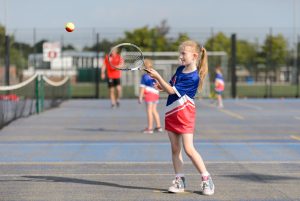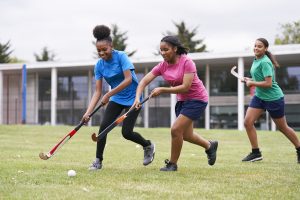In her first blog as CEO of Women in Sport, Stephanie Hilborne reflects on her first month in the role and shares why she decided to join the charity.

As I ride the train back home after navigating another day of the chaotic London commute, I can finally reflect on what has been an exciting and frantic four weeks at Women in Sport.
Some people may have been surprised to see me appointed as the new CEO of this charity. So was my mother. When I told her I was moving away from the environmental sector after 27 years and joining the sports world she said, “but you’re not even sporty.” Naturally, or perhaps unnaturally, I was affronted. I lived for sport when I was at school and was good at it, in fact I considered myself super ‘sporty’. I guess I retained that label in my mind, whereas perhaps Mum saw the woman I became, who struggles to make it to the pool regularly amidst the pressures and expectations of work and family.
Women in Sport’s recent insight, Reframing Sport for Teenage Girls, has highlighted the need to move away from these labels. We have been looking at girls’ lives and how sport can be a part of normal teenage life for them. We are developing new ways to engage girls in sport and physical activity.
The inactivity crisis, which is especially prevalent in women and girls, is something that urgently needs solving. At present, only 14% of girls age 5-16 achieve recommended levels of physical activity, and this drops to just 10% among 13 to 16-year-old girls. Women play much less sport than men as adults and in old age women lose many years of active life due to weaker muscles.
But the benefits go way beyond physical health. Playing team sport taught me the leadership, teamwork and resilience that has been the foundation of my adult life. It is about so much more than the game itself.
Why is this ‘sporty’ label so prevalent in our society? When I told other people I would be joining Women in Sport at the end of October, they either lit up and said “great, I love(d) playing netball” or looked downcast and said “how interesting, I was never very ‘sporty’”.
It seems that ‘sporty’ and ‘not sporty’ are particularly polarising and persistent labels.
The label is also not gender-balanced. Only 4 in 10 girls define themselves as ‘sporty’ compared to more than 6 out of 10 boys. These self-perceptions are usually based on experiences of sport at school, when girls more frequently opt out because they feel like they don’t fit the mould.
-
Only 14
%
of girls age 5-16 achieve recommended levels of physical activity
-
Only 10
%
of girls aged 13 to 16 achieve recommended levels of physical activity
After 27 years in the environment movement, I was ready to make a change. I was aware of the legacy of sport for me personally and also that far too many girls don’t have that opportunity. My home and school environment allowed me to be myself, unimpeded by social expectations or social media, in a way that very few girls now can. I’ve watched how the girls at my children’s schools did not play football at break, would drop out of netball in their teens if they ever played, and rarely cycled to school whereas whole packs of school boys would be on bikes every morning.
Gender inequality remains very live even in the UK and stereotypes kick in at a young age. One aspect of this is that women in the workplace remain at a disadvantage in a world designed by and for men in most cases. Change is coming but still only a handful of women chair FTSE100 companies and there remain big gaps in pay. Are young women also entering the workplace at a disadvantage because they are more likely to have missed out on the amazing benefits of sport and physical activity?
 Environmentalism, like gender equality, has not always been in the public consciousness. I’ve spent much of my career fighting for the environmental crisis to be acknowledged by society and Women in Sport has been doing the same for gender equality in sport since 1984.
Environmentalism, like gender equality, has not always been in the public consciousness. I’ve spent much of my career fighting for the environmental crisis to be acknowledged by society and Women in Sport has been doing the same for gender equality in sport since 1984.
We’ve seen progress in the level of media coverage of women’s sport with the 2019 Fifa Women’s World Cup, Netball World Cup and IAAF World Championships dominating the front and back pages throughout the summer. But it’s so important that this continues all-year around.
Women in Sport wants to help society deliver meaningful change at every stage of a woman’s life – focusing on teenage girls, physical activity during menopause and sports workplace culture.
We’re working on new insight and innovations that can shape the way women and girls engage in sport and physical activity. I’m excited about the amazing team I’ve joined and the transformation we are looking to achieve.



